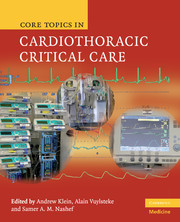Book contents
- Frontmatter
- Contents
- Contributors
- Preface
- Foreword
- Abbreviations
- SECTION 1 Admission to Critical Care
- SECTION 2 General Considerations in Cardiothoracic Critical Care
- SECTION 3 System Management in Cardiothoracic Critical Care
- 3.1 CARDIOVASCULAR SYSTEM IN CARDIOTHORACIC CRITICAL CARE
- 3.2 RESPIRATORY SYSTEM IN CARDIOTHORACIC CRITICAL CARE
- 3.3 RENAL SYSTEM IN CARDIOTHORACIC CRITICAL CARE
- 3.4 HAEMATOLGY AND TRANSFUSION IN CARDIOTHORACIC CRITICAL CARE
- 3.5 GASTROINTESTINAL SYSTEM IN CARDIOTHORACIC CRITICAL CARE
- 3.6 IMMUNE SYSTEM AND INFECTION IN CARDIOTHORACIC CRITICAL CARE
- 39 The role of the immune system in critical illness
- 40 Sepsis and the systemic inflammatory response syndrome
- 41 Infection control
- 42 Infective endocarditis
- 3.7 ENDOCRINE SYSTEM IN CARDIOTHORACIC CRITICAL CARE
- 3.8 NEUROLOGICAL SYSTEM IN CARDIOTHORACIC CRITICAL CARE
- SECTION 4 Procedure-Specific Care in Cardiothoracic Critical Care
- SECTION 5 Discharge and Follow-up From Cardiothoracic Critical Care
- SECTION 6 Structure and Organisation in Cardiothoracic Critical Care
- SECTION 7 Ethics, Legal Issues and Research in Cardiothoracic Critical Care
- Appendix Works Cited
- Index
40 - Sepsis and the systemic inflammatory response syndrome
from 3.6 - IMMUNE SYSTEM AND INFECTION IN CARDIOTHORACIC CRITICAL CARE
Published online by Cambridge University Press: 05 July 2014
- Frontmatter
- Contents
- Contributors
- Preface
- Foreword
- Abbreviations
- SECTION 1 Admission to Critical Care
- SECTION 2 General Considerations in Cardiothoracic Critical Care
- SECTION 3 System Management in Cardiothoracic Critical Care
- 3.1 CARDIOVASCULAR SYSTEM IN CARDIOTHORACIC CRITICAL CARE
- 3.2 RESPIRATORY SYSTEM IN CARDIOTHORACIC CRITICAL CARE
- 3.3 RENAL SYSTEM IN CARDIOTHORACIC CRITICAL CARE
- 3.4 HAEMATOLGY AND TRANSFUSION IN CARDIOTHORACIC CRITICAL CARE
- 3.5 GASTROINTESTINAL SYSTEM IN CARDIOTHORACIC CRITICAL CARE
- 3.6 IMMUNE SYSTEM AND INFECTION IN CARDIOTHORACIC CRITICAL CARE
- 39 The role of the immune system in critical illness
- 40 Sepsis and the systemic inflammatory response syndrome
- 41 Infection control
- 42 Infective endocarditis
- 3.7 ENDOCRINE SYSTEM IN CARDIOTHORACIC CRITICAL CARE
- 3.8 NEUROLOGICAL SYSTEM IN CARDIOTHORACIC CRITICAL CARE
- SECTION 4 Procedure-Specific Care in Cardiothoracic Critical Care
- SECTION 5 Discharge and Follow-up From Cardiothoracic Critical Care
- SECTION 6 Structure and Organisation in Cardiothoracic Critical Care
- SECTION 7 Ethics, Legal Issues and Research in Cardiothoracic Critical Care
- Appendix Works Cited
- Index
Summary
Introduction
Despite recent advances, ‘the systemic inflammatory response syndrome’ (SIRS), severe sepsis and septic shock still have an increasing incidence and unchanged mortality. The development of organ failure determines the course and prognosis of the septic patient. Progress has been made, particularly in areas such as pathophysiology, diagnosis, standard and adjunctive therapy, as well as experimental approaches. This includes genomic information for stratifying subgroups of patients, and a broader field of laboratory diagnostics from clinical studies and basic research on the cellular mechanisms of inflammation and organ dysfunction.
Systemic inflammatory response syndrome
The term SIRS was introduced in 1992 to denote the constellation of findings that result from systemic activation of the innate immune response, irrespective of the cause. The concept was that SIRS could be triggered by localized or generalized infections, trauma, thermal injury or sterile inflammatory processes, such as acute pancreatitis. From an operational standpoint, SIRS was considered to be present when patients had prespecified criteria.
The inflammatory events responsible for clinical derangements such as severe infection, sepsis, or septic shock are thought to be similar. These events lead to circulatory instability with respiratory distress according to the extent of infection and/or the intensity of the host response, culminating in single or multiple organ dysfunction syndromes. A major factor contributing to the belief that mediation of septic shock proceeds via well-defined molecular and cellular pathways irrespective of microbial taxonomy is the extensive database concerning bacterial septic shock syndromes.
- Type
- Chapter
- Information
- Core Topics in Cardiothoracic Critical Care , pp. 310 - 317Publisher: Cambridge University PressPrint publication year: 2008



